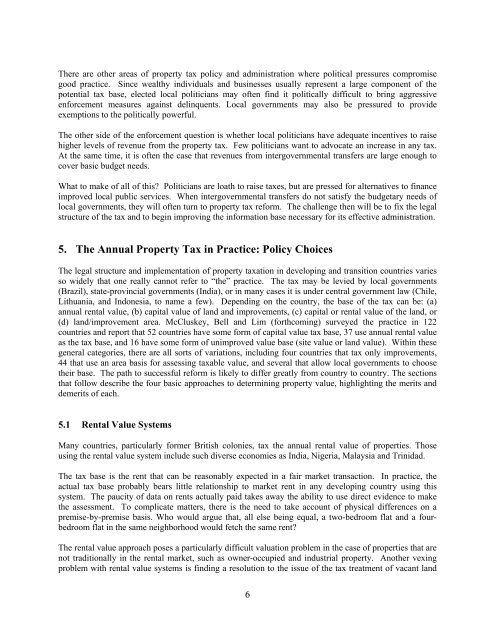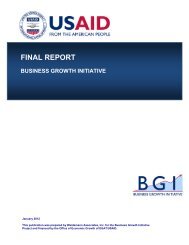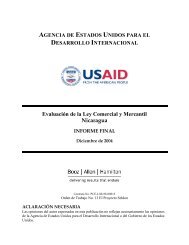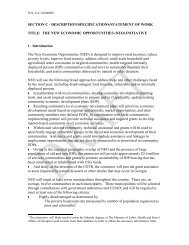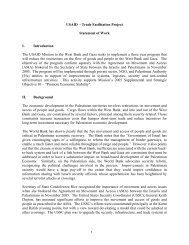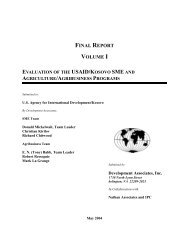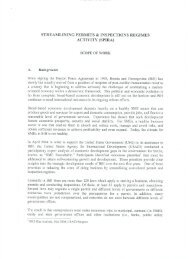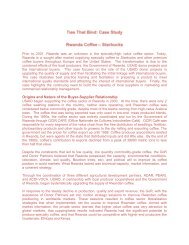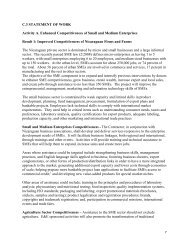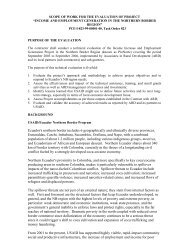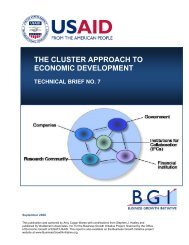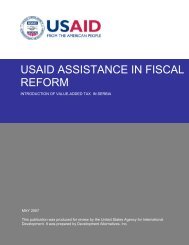Property Tax Reform in Developing and Transition Countries
Property Tax Reform in Developing and Transition Countries
Property Tax Reform in Developing and Transition Countries
You also want an ePaper? Increase the reach of your titles
YUMPU automatically turns print PDFs into web optimized ePapers that Google loves.
There are other areas of property tax policy <strong>and</strong> adm<strong>in</strong>istration where political pressures compromise<br />
good practice. S<strong>in</strong>ce wealthy <strong>in</strong>dividuals <strong>and</strong> bus<strong>in</strong>esses usually represent a large component of the<br />
potential tax base, elected local politicians may often f<strong>in</strong>d it politically difficult to br<strong>in</strong>g aggressive<br />
enforcement measures aga<strong>in</strong>st del<strong>in</strong>quents. Local governments may also be pressured to provide<br />
exemptions to the politically powerful.<br />
The other side of the enforcement question is whether local politicians have adequate <strong>in</strong>centives to raise<br />
higher levels of revenue from the property tax. Few politicians want to advocate an <strong>in</strong>crease <strong>in</strong> any tax.<br />
At the same time, it is often the case that revenues from <strong>in</strong>tergovernmental transfers are large enough to<br />
cover basic budget needs.<br />
What to make of all of this Politicians are loath to raise taxes, but are pressed for alternatives to f<strong>in</strong>ance<br />
improved local public services. When <strong>in</strong>tergovernmental transfers do not satisfy the budgetary needs of<br />
local governments, they will often turn to property tax reform. The challenge then will be to fix the legal<br />
structure of the tax <strong>and</strong> to beg<strong>in</strong> improv<strong>in</strong>g the <strong>in</strong>formation base necessary for its effective adm<strong>in</strong>istration.<br />
5. The Annual <strong>Property</strong> <strong>Tax</strong> <strong>in</strong> Practice: Policy Choices<br />
The legal structure <strong>and</strong> implementation of property taxation <strong>in</strong> develop<strong>in</strong>g <strong>and</strong> transition countries varies<br />
so widely that one really cannot refer to “the” practice. The tax may be levied by local governments<br />
(Brazil), state-prov<strong>in</strong>cial governments (India), or <strong>in</strong> many cases it is under central government law (Chile,<br />
Lithuania, <strong>and</strong> Indonesia, to name a few). Depend<strong>in</strong>g on the country, the base of the tax can be: (a)<br />
annual rental value, (b) capital value of l<strong>and</strong> <strong>and</strong> improvements, (c) capital or rental value of the l<strong>and</strong>, or<br />
(d) l<strong>and</strong>/improvement area. McCluskey, Bell <strong>and</strong> Lim (forthcom<strong>in</strong>g) surveyed the practice <strong>in</strong> 122<br />
countries <strong>and</strong> report that 52 countries have some form of capital value tax base, 37 use annual rental value<br />
as the tax base, <strong>and</strong> 16 have some form of unimproved value base (site value or l<strong>and</strong> value). With<strong>in</strong> these<br />
general categories, there are all sorts of variations, <strong>in</strong>clud<strong>in</strong>g four countries that tax only improvements,<br />
44 that use an area basis for assess<strong>in</strong>g taxable value, <strong>and</strong> several that allow local governments to choose<br />
their base. The path to successful reform is likely to differ greatly from country to country. The sections<br />
that follow describe the four basic approaches to determ<strong>in</strong><strong>in</strong>g property value, highlight<strong>in</strong>g the merits <strong>and</strong><br />
demerits of each.<br />
5.1 Rental Value Systems<br />
Many countries, particularly former British colonies, tax the annual rental value of properties. Those<br />
us<strong>in</strong>g the rental value system <strong>in</strong>clude such diverse economies as India, Nigeria, Malaysia <strong>and</strong> Tr<strong>in</strong>idad.<br />
The tax base is the rent that can be reasonably expected <strong>in</strong> a fair market transaction. In practice, the<br />
actual tax base probably bears little relationship to market rent <strong>in</strong> any develop<strong>in</strong>g country us<strong>in</strong>g this<br />
system. The paucity of data on rents actually paid takes away the ability to use direct evidence to make<br />
the assessment. To complicate matters, there is the need to take account of physical differences on a<br />
premise-by-premise basis. Who would argue that, all else be<strong>in</strong>g equal, a two-bedroom flat <strong>and</strong> a fourbedroom<br />
flat <strong>in</strong> the same neighborhood would fetch the same rent<br />
The rental value approach poses a particularly difficult valuation problem <strong>in</strong> the case of properties that are<br />
not traditionally <strong>in</strong> the rental market, such as owner-occupied <strong>and</strong> <strong>in</strong>dustrial property. Another vex<strong>in</strong>g<br />
problem with rental value systems is f<strong>in</strong>d<strong>in</strong>g a resolution to the issue of the tax treatment of vacant l<strong>and</strong><br />
6


